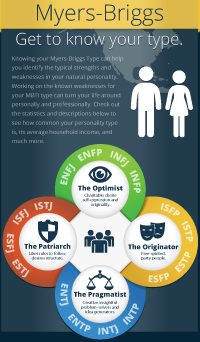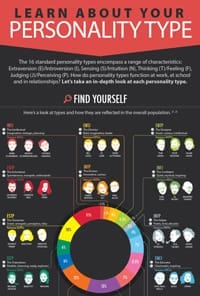Career Tips for ENFJ Personality Types (Extroverted-Intuitive-Feeling-Judging).
The Myers-Briggs Type Indicator® (MBTI®) emerged from Carl Jung’s theory of psychological types. According to The Myers-Briggs® Test, individuals generally fall into one of 16 different categories based on various personality characteristics. The MBTI® can aid in matching your personality type with careers that suit you best. It can be helpful in narrowing down career options based on personality dichotomies. For example, if MBTI® results indicate a high preference toward introversion and hence enjoyment for working independently, highly social careers such as marketing and advertising would most likely be avoided. Instead, working in a laboratory environment, with computers or small group environments, may be a more suitable career path.

Read about The Myers-Briggs® Test ENFJ Personality Types Career Tips and other Occupational Information.
ENFJ Personality Types (Extroverted-Intuitive-Feeling-Judging) and Career Choice.
ENFJs are warm, empathetic, and responsible. They are passionate people who seem to connect almost instantly with others. Many describe them as being inspiring and motivating, and ENFJs are fulfilled when they support others in realizing their potential and achieving their goals. As a result, they often find themselves drawn to careers and volunteer opportunities that involve mentoring, teaching, nursing, and coaching others to become the best version of themselves possible. ENFJs are also extremely loyal and take their relationships with others very seriously. While they are natural leaders, they tend to lead in an expressive manner, inspiring and motivating others rather than presenting reasoned arguments or lengthy speeches. They can best be described as “catalysts” who work well in groups and encourage others to contribute equally and exceptionally to the team effort.
Start Here ENFJs are also creative and imaginative individuals. They find it easy to see others’ potential and tend to build relationships based not on what a person actually does or how they act but rather on what their potential could be. This empathy and compassion for others is both ENFJs’ greatest strength and their greatest weakness. For instance, if they delay a project timeline because of a coworker’s stress, they may have difficulties explaining delays to their clients. Similarly, if they feel that their own gifts and contributions are not being recognized or rewarded, they may feel frustrated, become overly sensitive to criticism, and may even face imposter syndrome and depression. If ENFJ notices themselves feeling this way, they should reach out to their support network.
ENFJs excel in careers that involve working explicitly with assisting others. One subset of these careers focuses directly on mentoring, teaching, and counseling other people or even animals. These careers include being a psychologist, teacher, veterinary assistant, and home health aide. A second subset is concentrated on running a business but still involves working closely with others, for example, being an interior designer, meeting or convention planner, or public relations specialist. A third subset involves occupations in the arts. All of these careers have several characteristics in common: The possession of strong people skills; the ability to organize things, events, or people to achieve goals; and the requirement of intense energy, positivity, and vehemence. ENFJs are highly expressive, social individuals who find it difficult to thrive in isolation. They are also more detail-oriented than their more perceiving-driven counterparts, ENFPs, and so can perform intricate organizational tasks like event planning without getting overwhelmed. Other careers ENJFs are often found to enjoy are Child Care Worker, Clergy, Customer Service Representative, Dental Assistant, Executive Secretary or Administrative Assistant, Health Educator, Host or Hostess, Instructional Coordinators, Interior Designers, and Loan Counselors.
ENFJ Personality Types Goal Setting and Gathering Information.
ENFJs are idealistic to a certain extent. They often have many long-term goals and a plan of action to achieve them. However, they may have trouble capitalizing on new opportunities that emerge. One strategy for them to navigate last-minute changes is to set goals that are distinct and create subset goals leading up to these specifics. A tool for an ENFJ to examine is to assess each goal on a timeline, with added specific needs leading up to obtaining the objective. The visual representation of specific ventures required will enable an ENFJ to choose among alternative options and remain focused. ENFJ personality types should also set aside time to think about positions that they have not considered.
In order to gather information, ENFJ personality types will usually speak with others who are enthusiastic about the possibility of a new venture. They will search for positions that allow for innovation and education. When gathering these facts, it will be common for an ENFJ to disregard important details about occupations due to their narrowed search sourcing. They should remember to also research statistical information and facts at a career library or by visiting an online resource such as a government career database and to not rely solely on others’ opinions and experiences with an occupation. Determining what is important to them will be a big part of this process. For example, if the most important factor when searching for a new career is flexibility, ENFJs should ensure the alternatives which they are considering include this priority. Having a short list of options that focus on priorities will help narrow their search to particular careers which could provide success and happiness. Creating a short list of prospective careers can assist an ENFJ to proceed in the right direction of the exploration process.

Read about The Myers-Briggs® Test ENFJ Personality Types Career Tips and other Occupational Information.
ENFJ Personality Types and Networking.
Start The next step in the process is networking. ENFJ personality types are often the center of their social circles. They take on the responsibility of organizing social events and interactions among colleagues and friends and are often willing to shoulder the effort of event planning so that others can enjoy themselves. Others often see ENFJs as being energetic and enthusiastic. They are highly sensitive to other’s emotional states and are conscious of their need for emotional and psychological support. However, they are not afraid of forming their own opinions, upholding their own values, or asserting themselves when they need to do so. ENFJs are socially adept and are able to express themselves confidently without offending others. That said, while they do not generally compromise their own morals or values for others, they do have their priorities in line and will always place the needs of individuals above schedules, routines, and rules. They do not hesitate to exercise their own judgment in making these and other decisions that are in the best interest of individuals.
ENFJs innately will reach out to other people who might be able to offer information about careers of interest or who might be able to connect them with additional opportunities for growth and learning. These connections can assist with verifying the need to build additional skills, earn another degree, take some courses, or even find an apprenticeship or mentor. Networking can also help this personality type learn more about future coworkers and work environments. ENFJs should ask about vacation time, what a typical day is like, and what opportunities there are for upward mobility. ENFJs will innately appear to others as collaborating team players and will be able to highlight their quick learning capability. However, it is common for them to get caught in ineffectual connections by being overly talkative. They should remember to take a breath and slow down so future employers can ask questions. It is also common for this personality type to emphasize their potential outlook and not focus on how their immediate benefit can impact an organization. ENFJs should bring light to their “people first” personality and explain how this behavior can benefit organizational culture. Also, remembering the interviewer may be a part of an opposite personality dichotomy will also be useful. For example, ENFJs should highlight their ability to carry out specific tasks and produce tangible results when speaking to a Thinking interviewer and to not confound a Sensing interviewer with too many eventualities. Finding information related to how different personalities react is a helpful tool when interviewing and during pre-interview network endeavors and can lead to a multitude of offers.
ENFJ Personality Types and Decision-Making.
ENFJ personality types generally base decisions on personal values. They prioritize harmony and cooperation and value loyalty and trustworthiness over achievement, intelligence, and academic ability. Being a good person is generally more important to an ENFJ than being a high achiever or being very intelligent. For this reason, ENFJs are often motivated by challenges that involve contributing to the overall good of humanity. For instance, they might be more interested in developing a solution to a food or water crisis or a mental health issue than developing new technological innovations that benefit a very small number of wealthy individuals. They are rarely motivated by financial gain and instead find interpersonal benefits fulfilling.
As ENFJs commit to a specific course of action, they should take a step back and clarify what they value most and also consider the logical consequences of each option. They should prepare a shortlist, maybe two or three offers to consider and think through the details and logistics. For example, do any positions require relocation? If so, what will the impact be on the cost of living? What about a spouse or family member? If moving far from friends or family, consider visiting expenses and time away from work. As with anything in life, career changes are about balance. ENFJs have a tendency to fail to observe uncomfortable facts and to be manipulated by others’ needs and wants, so having a system to weigh these questions will assist with their decision-making process. A tool as simple as a pros and cons chart will allow for the consideration of all options. Both pros and cons should be value-based and logical. ENFJs should also take a period of rest and reflection before making an occupational decision in order to combat their innate behavior of making impulsive choices. Most importantly, knowing these behaviors and characteristics of nature and having the ability to work with these innate temperaments by using the Myers Briggs Type Indicator® can vastly improve the career exploration process and enable positive steps towards finding your best-fit career.
Learn More About the MBTI ENFJ Personality Type
Explore additional information that delves deeper into the ENFJ Personality Type by examining various personality and career-based subjects:
- How the MBTI ENFJ Type relates to Innovation
- How the MBTI ENFJ Type relates to Emotional Intelligence
- How the MBTI ENFJ Type relates to Leadership
- How the MBTI ENFJ Type relates to Project Management
- How the MBTI ENFJ Type relates to Decision Making
Click on the link below to read more about different MBTI Personality Types
| ISTJ | ISFJ | INFJ | INTJ | ESTP | ESFP | ENFP | ENTP |
| ISTP | ISFP | INFP | INTP | ESTJ | ESFJ | ENFJ | ENTJ |
References
Introduction to Type (Isabel Briggs Myers, 1998, CPP Inc.)
Introduction to Type and Careers (Allen L. Hammer, 2007, CPP Inc.)



